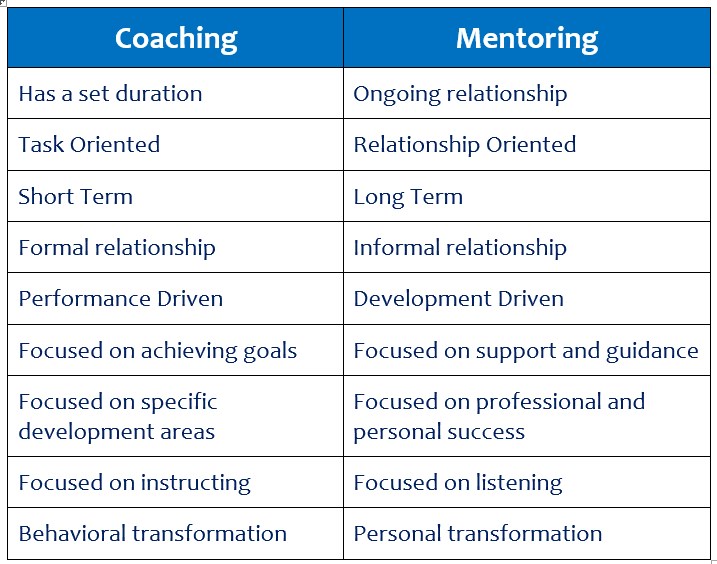Coaching and Mentoring – The Differences
People often use the terms “coaching” and “mentoring” interchangeably. However, they represent two separate and distinct types of functions and relationships.
Coaching is a more formal structured relationship centered on improving an individual’s performance and focuses on specific skills and goals.
Mentoring is a more informal relationship centered on an association in which a more experienced individual uses his or her knowledge to guide the development of an inexperienced individual.
Coaching and Mentoring – The Differences
About Coaching
- Typically a short-term relationship
- Generally has a set duration
- Performance based
- Formal relationship
- Experts in specific areas
- Focus is on improvements in behavior and performance to resolve current issues
- Emphasis is on instructing, assessing, and monitoring
- Focus is on specific development areas
- Focus is on business issues
- Focus is on knowledge, skills, or abilities to better perform a given task
- Concerned about behavioral transformation
- Coach directs the learning
- Uses various assessment instruments to measure results
- Usually a person’s direct report in an organization
- Has direct influence since the person is often his or her direct report
- Structured with meetings scheduled on a regular basis
- The meeting agenda is focused on achieving specific short-term goals
About Mentoring
- Ongoing relationship that lasts for a long time
- Informal relationship
- Two-way mutually beneficial relationship
- Development based
- Provides support and guidance to prepare them for future roles
- Emphasis is on listening, providing information, giving suggestions, and establishing personal connections
- Supports the mentee’s overall growth and development
- Takes a broader view of the person, not looking to develop a specific competency
- Focus is on professional and personal success
- Concerned about personal transformation
- Collaborative approach to learning
- Sharing of ideas and thoughts about different issues
- Provides advice
- Makes introductions to influential and helpful individuals
- Uses a low key, self-discovery approach
- Structure is self-directed and flexible
- Meetings taking place as and when the mentee needs some advice, guidance, or support
- Agenda is set by the mentee

